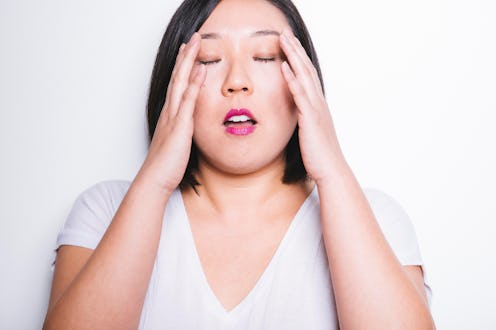
Being overly tired can totally wreck your day. Most of us will occasionally suffer from fatigue — a sense of being so tired that you can almost feel weary down to your bones. Usually, it comes from a temporary illness or from a lack of sleep, something that's easily remedied with a bit of rest. Even if you feel tired day after day, having a restful period with a lot of sleep can normally help set it right. But for some people, this fatigue can be a sign of something more. In some cases, extreme tiredness might actually be excessive daytime sleepiness. "At first, these two may seem like the same thing, but they aren't," Chris Brantner, sleep expert and founder of SleepZoo, tells Bustle. "We all get tired sometimes. But that comes and goes with adequate rest. However, excessive daytime sleepiness (EDS) is a chronic issue that indicates something is afoot."
The difference between excessive daytime sleepiness and normal, occasional fatigue can be difficult to explain. Certainly, some of us can feel so tired that it feels undeniably excessive, but that's not necessarily EDS. When it comes to EDS, there's a severity and tenacity to the tiredness that goes beyond what most of us have experienced. So how can you tell the difference? Here's a sign that your tiredness is actually EDS, according to experts.
1Sleep Doesn't Help
One major sign of EDS is that the amount of sleep you get doesn't make a difference to how tired you are. "I think the main difference between these two for me is that with EDS, no matter how much sleep you get, you are still tired," clinical psychologist and sleep doctor Dr. Michael Breus, tells Bustle. If you sleep for eight or more hours night after night and still feel sleepy during the day, that definitely can be an indicator that there's a larger sleep issue at play.
2You Feel Tired During Every Activity
Most of us feel tired after we finish an activity, but with EDS, that fatigue continues during every activity a person tries to do. "In addition we see EDS when a person is doing many different activities (driving, eat, etc)," Dr. Breus says. "While when a person is 'just tired' we see them have energy during activities and then become sleepy after the activity is complete."
3It's A More Intense Sleepiness
Although it may be difficult to tell the difference if you've never experienced EDS, EDS comes with a more intense sleepiness than just being fatigued does. "In my opinion, EDS is a more intense and constant sleepiness," Dr. Breus says. If you've experienced both, you'll probably be able to tell the difference.
4You Feel Totally Exhausted
If you feel a bit sleepy during the day, that might just be fatigue — because EDS is about more than just sleepiness, it's about feeling totally wiped out. "EDS is more like exhaustion," Brantner says. "It's a deep sleepiness and lack of energy that simply doesn't go away, even after a full night of sleep. EDS often signifies an underlying sleep disorder. For example, you may be suffering from sleep apnea, which doesn't allow you to get a full night's rest, even though you think you're sleeping through the night."
5It Affects Your Day-To-Day
One big difference between sleepiness and EDS is how much you're able to function in your daily life. "I'd say that anything 'excessive' means, it's really interfering with your daily functioning," Dr. Els van der Helm, Founder of Shleep, tells Bustle. "...If you need an alarm to wake up in the morning, that already means you're not getting enough sleep, but you might not suffer from excessive daytime sleepiness. If you have no difficulty with your normal daily to-dos, tasks, your mood, and overall health you might be getting too little sleep, but not to a level where it's greatly impacting you during the day." Dr. van der Helm also points out that not getting enough sleep can still be bad for your health, of course — so it's really important to make sleep a priority.
6You Suffer With Anxiety Or Irritability
The chronic nature of EDS means that it can also affect your mood and even your mental health. "Another cluster common signs of EDS can be anxiety, irritability, and restlessness," Ginger Houghton, LMSW, CAADC, owner of Bright Spot Counseling, tells Bustle. "For folks who have EDS, the feeling of exhausted impacts their mood and ability to feel well and balanced on a regular basis." If you feel like your sleepiness is impacting your mood or personality, it may be a sign that there's a larger issue.
7You Fall Asleep At Odd Times
Feeling sleepy during the day might happen to a lot of us, but in some cases of EDS it might feel more like an inability to stay awake, even at important moments. "Falling asleep when unintended, such as when stopped at a traffic light, or in a meeting," Nate Watson, MD, SleepScore Labs advisory board member, tells Bustle is a sign of EDS, as well as heavily relying on caffeine to get through the day.
While being tired during the day is totally normal if you haven't gotten enough sleep, if you can't seem to shake the feeling — no matter how much sleep or rest you get — you may want to talk to a doctor. If your sleepiness is affecting your daily life, seeking out professional help might make all the difference.